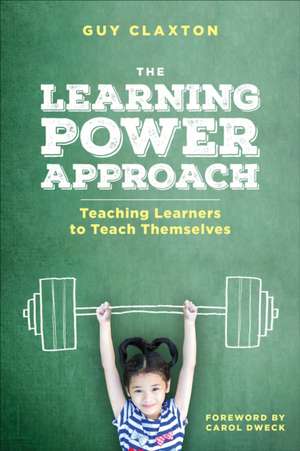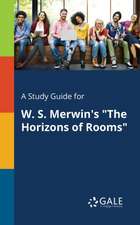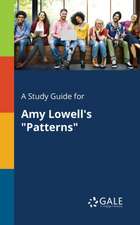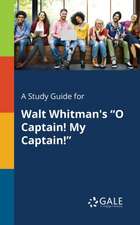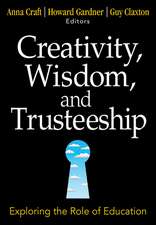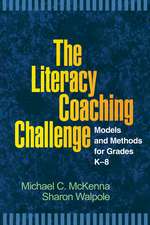The Learning Power Approach: Teaching Learners to Teach Themselves: Corwin Teaching Essentials
Autor Guy Claxtonen Limba Engleză Paperback – 6 mar 2019
| Toate formatele și edițiile | Preț | Express |
|---|---|---|
| Paperback (2) | 125.76 lei 3-5 săpt. | +21.66 lei 6-12 zile |
| Crown House Publishing – 15 ian 2018 | 125.76 lei 3-5 săpt. | +21.66 lei 6-12 zile |
| SAGE Publications – 6 mar 2019 | 188.51 lei 3-5 săpt. | +18.85 lei 6-12 zile |
Din seria Corwin Teaching Essentials
-
 Preț: 197.23 lei
Preț: 197.23 lei -
 Preț: 282.10 lei
Preț: 282.10 lei -
 Preț: 247.31 lei
Preț: 247.31 lei -
 Preț: 278.92 lei
Preț: 278.92 lei -
 Preț: 245.89 lei
Preț: 245.89 lei -
 Preț: 189.99 lei
Preț: 189.99 lei -
 Preț: 281.38 lei
Preț: 281.38 lei -
 Preț: 216.12 lei
Preț: 216.12 lei -
 Preț: 195.85 lei
Preț: 195.85 lei -
 Preț: 165.86 lei
Preț: 165.86 lei -
 Preț: 280.37 lei
Preț: 280.37 lei -
 Preț: 269.07 lei
Preț: 269.07 lei -
 Preț: 290.65 lei
Preț: 290.65 lei -
 Preț: 154.25 lei
Preț: 154.25 lei -
 Preț: 275.92 lei
Preț: 275.92 lei -
 Preț: 196.64 lei
Preț: 196.64 lei -
 Preț: 278.92 lei
Preț: 278.92 lei -
 Preț: 191.99 lei
Preț: 191.99 lei -
 Preț: 228.05 lei
Preț: 228.05 lei -
 Preț: 274.24 lei
Preț: 274.24 lei -
 Preț: 152.25 lei
Preț: 152.25 lei -
 Preț: 278.10 lei
Preț: 278.10 lei -
 Preț: 288.05 lei
Preț: 288.05 lei -
 Preț: 239.30 lei
Preț: 239.30 lei -
 Preț: 191.99 lei
Preț: 191.99 lei -
 Preț: 272.03 lei
Preț: 272.03 lei -
 Preț: 185.60 lei
Preț: 185.60 lei -
 Preț: 175.41 lei
Preț: 175.41 lei -
 Preț: 192.18 lei
Preț: 192.18 lei -
 Preț: 270.70 lei
Preț: 270.70 lei -
 Preț: 271.26 lei
Preț: 271.26 lei -
 Preț: 276.90 lei
Preț: 276.90 lei -
![Answers to Your Biggest Questions About Creating a Dynamic Classroom: Five to Thrive [series]](https://i3.books-express.ro/bs/9781071856789/answers-to-your-biggest-questions-about-creating-a-dynamic-classroom.jpg) Preț: 235.32 lei
Preț: 235.32 lei -
 Preț: 269.35 lei
Preț: 269.35 lei -
 Preț: 85.05 lei
Preț: 85.05 lei -
 Preț: 191.94 lei
Preț: 191.94 lei -
 Preț: 269.35 lei
Preț: 269.35 lei -
 Preț: 191.99 lei
Preț: 191.99 lei -
 Preț: 185.60 lei
Preț: 185.60 lei -
 Preț: 268.25 lei
Preț: 268.25 lei -
 Preț: 246.82 lei
Preț: 246.82 lei -
 Preț: 284.12 lei
Preț: 284.12 lei -
 Preț: 196.17 lei
Preț: 196.17 lei -
 Preț: 245.70 lei
Preț: 245.70 lei -
 Preț: 246.00 lei
Preț: 246.00 lei -
 Preț: 276.19 lei
Preț: 276.19 lei -
 Preț: 278.61 lei
Preț: 278.61 lei -
 Preț: 277.83 lei
Preț: 277.83 lei -
 Preț: 277.01 lei
Preț: 277.01 lei
Preț: 188.51 lei
Nou
36.07€ • 37.21$ • 30.10£
Carte disponibilă
Livrare economică 06-20 martie
Livrare express 19-25 februarie pentru 28.84 lei
Specificații
ISBN-10: 1506388701
Pagini: 288
Dimensiuni: 152 x 229 x 18 mm
Greutate: 0.46 kg
Ediția:1
Editura: SAGE Publications
Colecția Corwin
Seria Corwin Teaching Essentials
Locul publicării:Thousand Oaks, United States
Recenzii
"In person, Guy Claxton balances the precision of academia with the warmth and wit of our most beloved teachers. He challenges, engages and inspires in equal measure. It is the same when he writes; he transforms complexities of learning into recommendations that are both inviting and inspirational, and he does so without ever losing the subtlety of nuance or culture. He is the perfect “critical friend” and The Learning Power Approach is the exemplary handbook."
"We have to radically reimagine education if we’re going to fulfill the potential of today’s students as leaders who will address our increasingly global challenges. The Learning Power Approach is a valuable map, not just to student success but also to a more peaceful, prosperous and sustainable planet."
"Guy Claxton challenges the traditional approaches to learning that exist in so many of our schools and presents a compelling and practical strategy to foster authentic thinking and learning for all. The Learning Power Approach is rooted in the belief that we must move beyond systems that categorize and judge people merely on their ability to do well in exams and tests, or learning that promotes the myth of the “one right answer”—to cultures that focus on “the cultivation of the confidence and capacity to be a good learner.” Claxton identifies and describes the diverse variety of strengths essential to successful learning and presents practical approaches to make these a priority.
This is a great book. It is a must read for those who understand the uniqueness of abilities in all of their students and would like to set in play a culture of learning that makes this flourish—a culture of learning that is inclusive and personal."
"Reading this book was a joy. As a writer, Claxton is beautifully able to express the what’s, why’s and the HOW’s of the learning power approach. His argument is urgent but it is expressed with great warmth making it a compelling read. Claxton’s work has just the right mix of accessibility and challenge.
Central to the Learning Power Approach is the belief that it is every teacher’s responsibility to nurture the student as learner and to grow learners who are ‘mind fit’. Learning itself is learnable! I challenge any teacher to read this and not come away questioning their practice and inspired to ‘tweak’ their classroom spaces, language and the way they design lessons. Reading this book will help teachers understand more clearly, the way ‘every lesson, every day’ gradually shapes the way students see themselves as learners and their understanding of the process of learning itself. This is the beauty of the Learning Power Approach. It is not a program, not a subject, not an add-on - it is something all teachers can integrate into their practice on a daily basis. Claxton’s work helps us notice ‘what lies beneath’ the surface of our teaching and to attend much more closely to the way we shape dispositions and attitudes to learning. As an ardent inquirer, I found the’ wonderings’ at the end of each chapter particularly stimulating. These wonderings would be a great way to prompt conversation and action amongst teachers, making it a marvelous text for rich, collaborative conversations across an entire school community.
Claxton often uses the metaphor of a coach to describe the work of teachers using the Learning Power Approach and there are some fascinating and helpful case studies of such coaches in action throughout the text. After reading this book, I feel as if I have spent time with one of the very best learning coaches there is. I can already envisage ‘The Learning Power Approach’ dog-eared and lovingly littered with post-it notes on my shelf. This book deserves a place in every teacher’s collection."
"We are always trying to see through the eyes of learners and guiding them on their way to become their own teachers. This is that guide."
Cuprins
Acknowledgments
About the Author
Chapter 1. The Origins of the Learning Power Approach
Nuclear Family
Godparents
Friends and Neighbors
Near Misses
A Socket Set
Chapter 2. What Is Learning?
Why Do We Learn?
When Do We Learn?
What Is the Launchpad for Learning?
What Do Learners Actually Do?
The Beginnings of Learning Power
So Can You Get Better at Learning?
What Kinds of Learning Are Going On in Classrooms?
Chapter 3. What Exactly Is the Aim of the Learning Power Approach?
Diving In: The Aim of the Learning Power Approach
Some Flesh on the Bones
Chapter 4. How Do I Get Started? Some Quick Wins
The LPA Menu du Jour
Curious, Adventurous, Determined, Collaborative: A Starter Kit of Learning Dispositions
A Reflective Exercise
Chapter 5. Why Does Learning Power Matter? 10 Good Reasons for Pumping Those Learning Muscles
1. Because Life Is Complicated
2. Because Learning Power Makes the World a Safer Place
3. Because We Won’t Always Be There
4. Because Good Learners Are More Successful in Life
5. Because Employers Want to Hire Powerful Learners
6. Because Powerful Learners Do Better in School
7. Because Powerful Learners Do Better in College
8. Because It Makes Teaching Easier and More Rewarding
9. Because People Are Happier When They Are Learning
10. Because Young People’s Mental Health Depends Upon Their Learning Power
Chapter 6. What Is Learning Power Made Of?
The Elements of Learning Power
Chapter 7. Learning Power in Action: Some Classroom Illustrations
Chapter 8. Design Principles of the LPA Classroom
1. Create a Feeling of Safety
2. Distinguish Between Learning Mode and Performance Mode
3. Organize Compelling Things to Learn
4. Make Ample Time for Collaboration and Conversation
5. Create Challenge
6. Make Difficulty Adjustable
7. Show the Innards of Learning
8. Make Use of Protocols, Templates, and Routines
9. Use the Environment
10. Develop Craftsmanship
11. Allow Increasing Amounts of Independence
12. Give Students More Responsibility
13. Focus on Improvement, Not Achievement
14. Lead by Example
Chapter 9. What Is the Evidence for the Learning Power Approach?
Does Curiosity Affect Learning?
What About Concentration?
Can Learners’ Resilience Be Deliberately Increased?
Does Resilience Contribute to Raising Achievement in School?
Does Imagination Improve Learning and Creativity, and Can People Get Better at Imagining?
Do Deliberate Attempts to Teach Students to Think Clearly Work? And Do They Improve School Performance?
What About Collaboration?
Does the Same Apply to Empathy?
Does Reflection Aid Learning?
Does Learning Power Developed in One Context Transfer to Other Contexts?
Chapter 10. Distinctions and Misconceptions
Focus on Learning Power, Not Just Learning
Learning, Not Thinking
Learning Dispositions Are Malleable, Not Fixed
Is the LPA “Traditional” or “Progressive”?
Evidence, Not Measurement
Precision About Language
Learning Muscles and the Mind Gym
Pedagogy Rules
It’s Not Just Classrooms; It’s the Ethos of the Whole School
Provisional and Growing, Not Set in Stone
Chapter 11. Joining the Culture Club
Bibliography and References
Resources and Further Reading
Index
Notă biografică
Guy Claxton is Professor of the Learning Sciences at the University of Bristol Graduate School of Education, where he directs the research initiative on Culture, Learning, Identity and Organisations (CLIO). His books include The Wayward Mind: An Intimate History of the Unconscious (2005), Learning for Life in the 21st Century: Sociocultural Perspectives on the Future of Education (2002, co-edited with Gordon Wells), Wise Up: Learning to Live the Learning Life (1999) and the best-selling Hare Brain, Tortoise Mind: Why Intelligence Increases When You Think Less (1997). His current work focuses on the development of infused approaches to the cultivation of positive lifelong learning dispositions in schools. The resulting ¿Building Learning Power¿ approach has influenced practice in schools throughout the UK, Australia and New Zealand.
